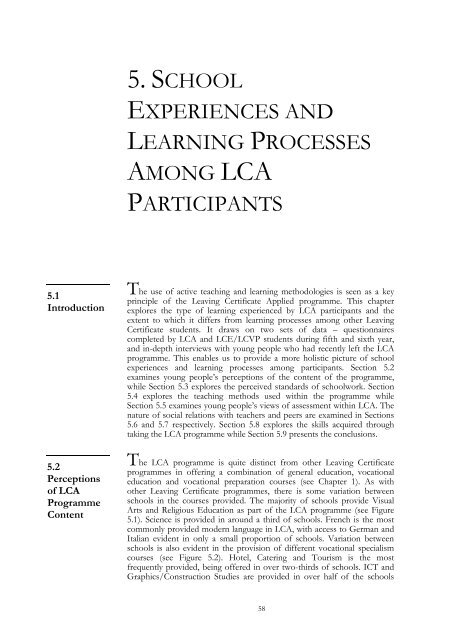Student Experiences of the Leaving Certificate Applied Programme
Student Experiences of the Leaving Certificate Applied Programme
Student Experiences of the Leaving Certificate Applied Programme
You also want an ePaper? Increase the reach of your titles
YUMPU automatically turns print PDFs into web optimized ePapers that Google loves.
5. SCHOOLEXPERIENCES ANDLEARNING PROCESSESAMONG LCAPARTICIPANTS5.1IntroductionThe use <strong>of</strong> active teaching and learning methodologies is seen as a keyprinciple <strong>of</strong> <strong>the</strong> <strong>Leaving</strong> <strong>Certificate</strong> <strong>Applied</strong> programme. This chapterexplores <strong>the</strong> type <strong>of</strong> learning experienced by LCA participants and <strong>the</strong>extent to which it differs from learning processes among o<strong>the</strong>r <strong>Leaving</strong><strong>Certificate</strong> students. It draws on two sets <strong>of</strong> data – questionnairescompleted by LCA and LCE/LCVP students during fifth and sixth year,and in-depth interviews with young people who had recently left <strong>the</strong> LCAprogramme. This enables us to provide a more holistic picture <strong>of</strong> schoolexperiences and learning processes among participants. Section 5.2examines young people’s perceptions <strong>of</strong> <strong>the</strong> content <strong>of</strong> <strong>the</strong> programme,while Section 5.3 explores <strong>the</strong> perceived standards <strong>of</strong> schoolwork. Section5.4 explores <strong>the</strong> teaching methods used within <strong>the</strong> programme whileSection 5.5 examines young people’s views <strong>of</strong> assessment within LCA. Thenature <strong>of</strong> social relations with teachers and peers are examined in Sections5.6 and 5.7 respectively. Section 5.8 explores <strong>the</strong> skills acquired throughtaking <strong>the</strong> LCA programme while Section 5.9 presents <strong>the</strong> conclusions.5.2Perceptions<strong>of</strong> LCA<strong>Programme</strong>ContentThe LCA programme is quite distinct from o<strong>the</strong>r <strong>Leaving</strong> <strong>Certificate</strong>programmes in <strong>of</strong>fering a combination <strong>of</strong> general education, vocationaleducation and vocational preparation courses (see Chapter 1). As witho<strong>the</strong>r <strong>Leaving</strong> <strong>Certificate</strong> programmes, <strong>the</strong>re is some variation betweenschools in <strong>the</strong> courses provided. The majority <strong>of</strong> schools provide VisualArts and Religious Education as part <strong>of</strong> <strong>the</strong> LCA programme (see Figure5.1). Science is provided in around a third <strong>of</strong> schools. French is <strong>the</strong> mostcommonly provided modern language in LCA, with access to German andItalian evident in only a small proportion <strong>of</strong> schools. Variation betweenschools is also evident in <strong>the</strong> provision <strong>of</strong> different vocational specialismcourses (see Figure 5.2). Hotel, Catering and Tourism is <strong>the</strong> mostfrequently provided, being <strong>of</strong>fered in over two-thirds <strong>of</strong> schools. ICT andGraphics/Construction Studies are provided in over half <strong>of</strong> <strong>the</strong> schools58

















